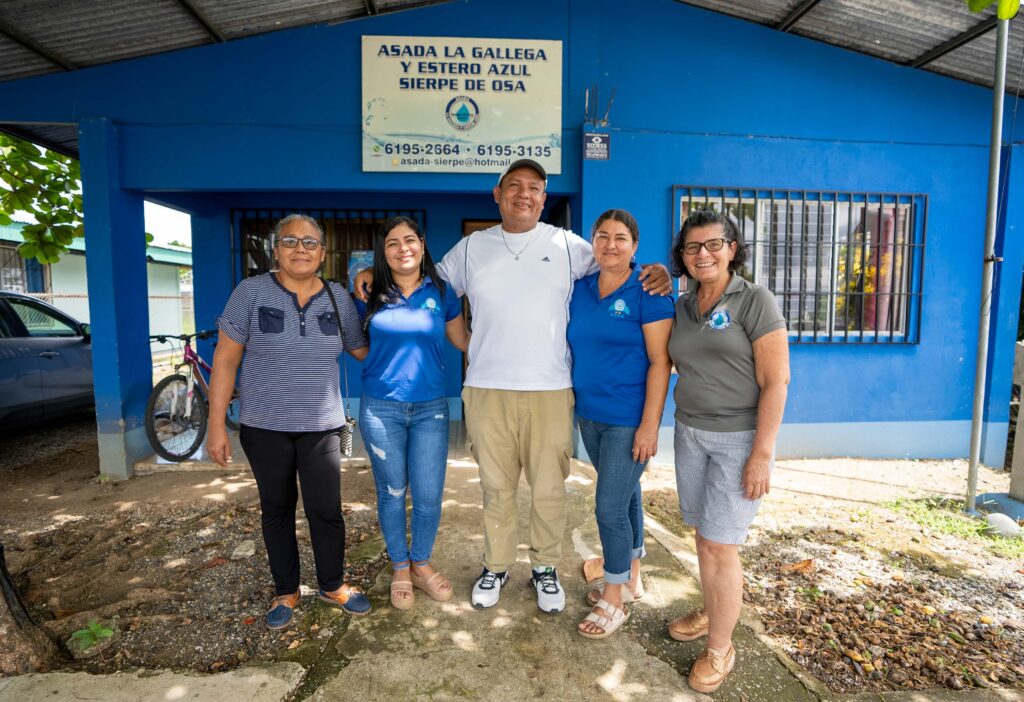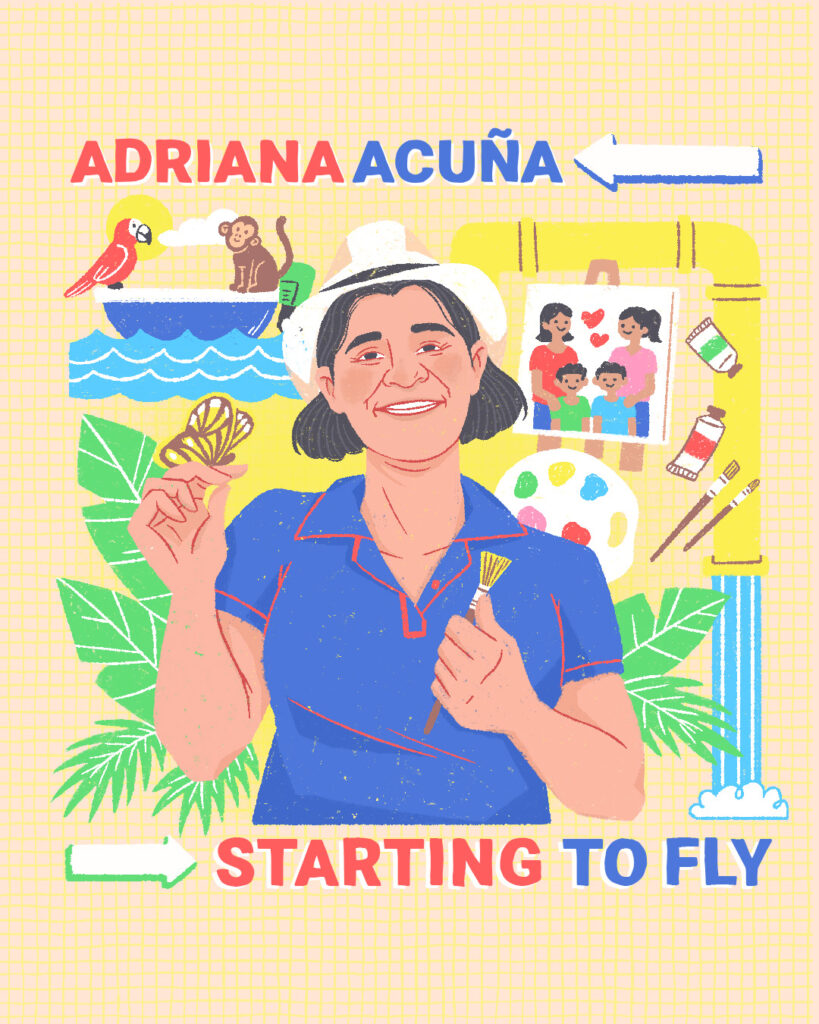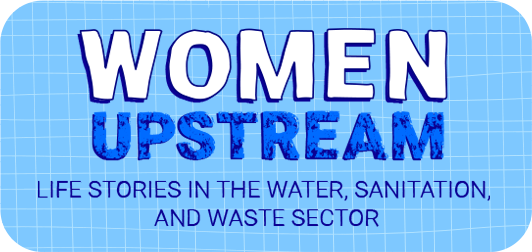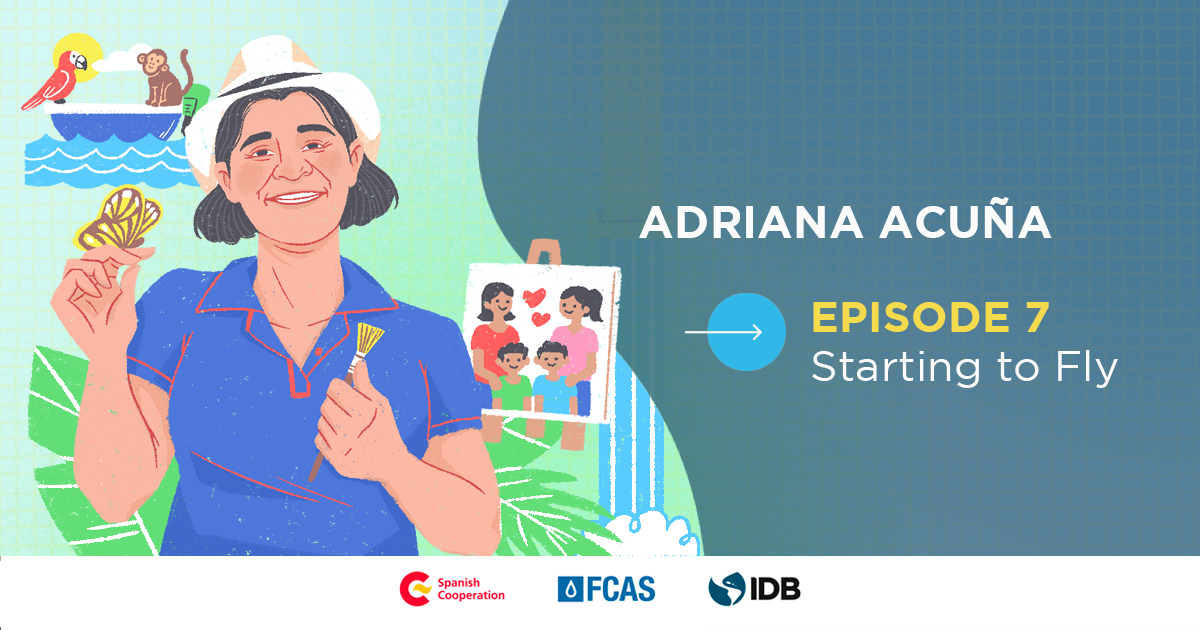Written by Andrea Ortega
Spanish version is available here
Although the administration and organization around water in her community was dominated by men, Adriana made her way with improvements in the work environment, supervision of projects, and inclusion of all members of her community.
Adriana learned about female leadership in the rural world since she was little. She was born into two matriarchies, in San Vito de Coto Brus, in the upper area of Costa Rica. Both of her grandmothers were young widowers and raised their families. Adriana grew up on the farm of one of her grandmothers, where they drew water for cooking and drinking from a well, but to bathe and wash they had to walk 20 minutes to a nearby stream.
After a brief stay in another town, where, for the first time she had uninterrupted water and electricity services inside the house, Adriana and her family moved to Sierpe de Osa, a rural area in western Costa Rica. The most difficult thing was getting used to the lack of water again, since pipes were just being installed in this area to access the water from a dam. “There were times when the water arrived mixed, because animals entered the water intake and the mud passed through. Those first beginnings were complicated,” she remembers.
Sierpe de Osa continued to grow and Adriana and her family made that place their definitive home. And in 2013, finally, a project helped improve access to drinking water and sanitation in the area. The biggest challenge was overcoming the obstacles they had previously faced in managing the water administrations and boards. Thus, a friend of Adriana asked her for help in reading the board’s economic report in front of the Assembly. By then, Adriana, motivated by one of her childhood dreams, had become a businesswoman. In addition to taking care of her family, she was dedicated to managing her hotel business. However, after her presentation in the Assembly, they invited her to be part of the board and they proposed that she be a prosecutor. At that moment, Adriana noticed that, like her, many women had the right to be part of the board, however, they did not know it and it remained a field dominated by men.
Supervise to empower
Excited to be part of a new project, Adriana agreed to be a prosecutor for nine months without knowing what problems she would encounter. “I didn’t know what was happening internally, the machismo. It was very hard because it was a group of men. Although women were beginning to participate, the most senior positions were held by men,” she recalls. Adriana immediately noticed the sexism within the board and how they ignored the administrator’s instructions because of her gender.
For Adriana these were difficult months, where many times she had to remain silent because her male colleagues did not listen to her. However, this did not stop her prosecutorial tasks and at the end of her administration she presented a report that revealed all the board’s irregularities to the Assembly. At that moment a change of board was determined, the previous team resigned and Adriana was elected as the new president, due to her great performance as a prosecutor.
Adriana’s appointment and attitude began to make way for more women to assume leadership positions in the administration of water, to the point that she managed to form a team where the majority were women. For her, this change would not have been possible without the training that they received through the water projects.
“The other colleagues in the group, seeing that we have changed the mentality, participated more. At first they were afraid, but little by little they have joined in. We see more participation in the assemblies, many more women attend than before. We try to give them training once a year so that they see that we are the ones who manage the water resource in the community,” she explains.

Water: an inclusive component
In addition to the benefits that the community has experienced, by achieving better access to water and sanitation, Adriana has managed to improve the way these resources are managed. Her entrepreneurial spirit and management led her to organize team meetings, get to know management and other board members better to create a welcoming and inclusive work environment, where everyone’s opinions – regardless of their gender – are equally valid.
“What I wanted was open communication, where everyone felt comfortable and confident expressing their opinions without anyone overlooking them or ignoring them, as happened to us before. Provide an environment where they can express their ideas, complaints and needs, so that we do not give 100% but 200% and it is reciprocal, and it has worked,” he says.
For Adriana there are still many challenges in her community. Nearby farms contaminate some of the water intakes and produce turbidity. Furthermore, in its area there are no nearby springs. Therefore, they continue to evaluate and look for opportunities. Their goal now is to also help nearby communities that still do not have water.

Adriana says she continues working so that her grandchildren can now enjoy a better quality of life in the city where her entire family has grown up. She comments that, although she never thought of dedicating herself to working on water projects, she now prefers to stay in that part, because in addition to improving the quality of life of her community, it is also a tool to encourage and educate women in the community. zone. “I say I dream with my eyes open, but I do it because I know we can achieve it. My colleagues on the board get excited, they get excited and that’s why we continue. We were chosen again to lead the board, because we presented things clearly and transparently and because we know that we can continue moving forward and, above all, we can continue dreaming,” she says.
The IDB together with the AECID have the common objective of providing quality water and sanitation services in rural areas of the region. Learn more about the projects carried out so far with the Cooperation Fund for Water and Sanitation (FCAS) in this publication

“Women Upstream”. Follow each story to learn more about the lives of women who have worked for their community with tenacity, perseverance and gaining leadership in spaces that used to be only for men.
Every month we will upload a new profile
To learn more about “Women Upstream” subscribe to our blog here.
Upstream Women’s Team:
Coordination: Anamaría Núñez, María Augusta Olmedo and Leticia Ortega
IDB Gender Specialists: Naiara Martínez
Content: Andrea Ortega Carreño and Paul Constance
Illustration: Verónica Alvarado and Carolina Curbelo
Audiovisual Production: Adriana Loeff


Leave a Reply